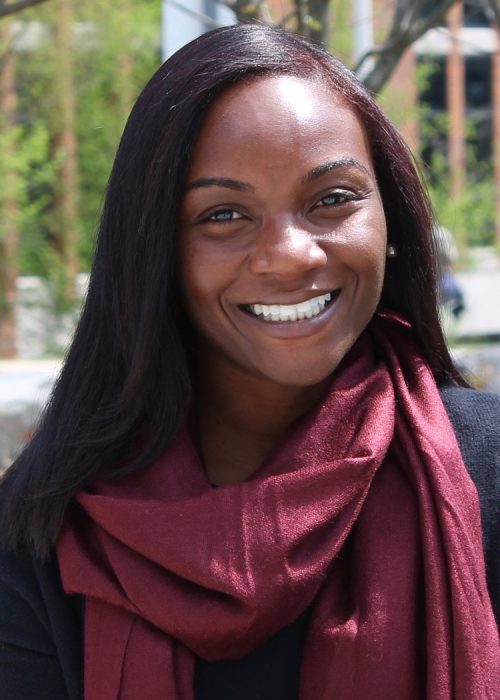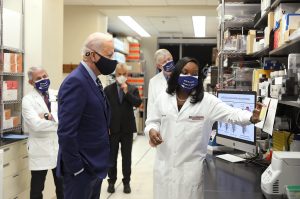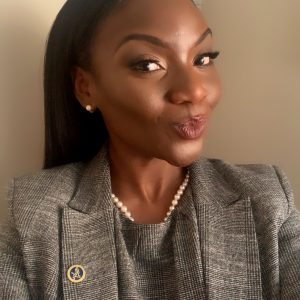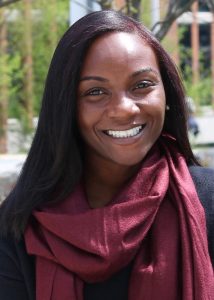
You may have heard of Dr. Kizzmekia Corbett, the black female NIH scientist who led the NIH team that co-developed one of the FDA-authorized coronavirus vaccines with Moderna. But did you know that she’s a Tar Heel?!
A native of North Carolina, 35 year old Dr. Kizzmekia “Kizzy” Corbett was born in Hurdle Mills and raised in Hillsborough, where she attended A.L. Stanback Middle School and Orange High School. She was a curious kid, often researching topics she was interested in on the internet, and although her parents initially thought she might become a police detective, this curiosity soon translated into a love of science experiments. Corbett got her start in scientific research here at UNC Chapel Hill, where she spent two high school summers conducting research in Kenan Labs through the American Chemical Society Project SEED program. From this young age, she set her sights on a doctorate degree in science.
Corbett, a first-generation college student, then went on to be a Meyerhoff Scholar and an NIH Undergraduate Scholar at the University of Maryland-Baltimore County (UMBC), where she double majored in Biological Sciences and Sociology on a full ride scholarship. Her undergraduate research focused on respiratory syncytial virus. This contagious and difficult to vaccinate virus can have severe complications for children and the elderly, but most people are exposed without exhibiting symptoms.
After completing her undergraduate degree, Corbett then returned to North Carolina to obtain her Ph.D. in Microbiology and Immunology from UNC Chapel Hill in 2014, studying virus infections in the lab of Prof. Aravinda de Silva within the UNC School of Medicine. Her dissertation — entitled “Characterization of Human Antibody Responses to Dengue Virus Infections in a Sri Lankan Pediatric Cohort” — focused on the pathogenesis of dengue in Sri Lankan children. Dengue is the most significant mosquito-borne viral disease in the world in terms of costs and health complications, but no anti-viral medications or vaccines exist. Corbett analyzed the effects of circulating virus strains and pre-existing antibodies on disease outcome, searching for a specific viral antibody response that could prove vital for vaccine development. Additionally, she received a UNC Graduate School Off-Campus Dissertation Research Fellowship to travel to Sri Lanka for a year in order to collect blood samples from children exposed to a viral strain newly detected in that region. While a graduate student at UNC, Corbett was also active outside of the lab. She was a representative for UNC Student Congress, a staff member for the Honor System Attorney General, a member of the Science Policy and Advocacy Group, and a delegate for the UNC System Association of Student Governments. 
Upon receiving her Ph.D., Corbett began her career as a research fellow and later scientific lead at the Vaccine Research Center in the National Institute of Allergy and Infectious Diseases (NIAID) of the National Institutes of Health (NIH). Here is where she would develop the mRNA coronavirus vaccine with Moderna to combat the COVID-19 pandemic, but Corbett was conducting research to inform coronavirus and influenza vaccine development well before the pandemic hit. Much of this research focused on a different coronavirus, MERS-CoV, for which Corbett and her colleagues developed an experimental mRNA vaccine that was tested in mouse and monkey models. With the start of the COVID-19 pandemic, the NIH partnered with pharmaceutical company Moderna to transfer these findings to the SARS-CoV-2 virus that causes COVID-19. Even though the previously developed MERS mRNA vaccine had not been tested on humans, it offered the ability to easily reshape the gene fragments in order to target different viruses and variants, making it the perfect candidate for the rapid development of a vaccine to be produced on a mass scale. Just two days after receiving the full genomic sequence of SARS-CoV-2 from Chinese scientists, Corbett’s lab had developed a vaccine for COVID-19. Clinical trials began an unprecedented 66 days after viral sequence release and showed a 94% effectiveness rate for humans; the NIH/Moderna vaccine soon received Emergency Use Authorization from the FDA in December 2020.
 Since distribution of the vaccine has progressed, Corbett has risen to public fame as the face of a new diverse generation of scientists. She has received innumerable awards and praises for her work: the Benjamin Franklin NextGen Award from the Franklin Institute; the Key of Life Award from the NAACP; proclamations of “Dr. Kizzmekia “Kizzy” Day” from Hillsborough, Orange County, Chapel Hill, and Carrboro; and a spot on the Time100 Next 2021 List where she was profiled by NIAID director Dr. Anthony Fauci to name a few (no really, just a few — this CV is a novel). As of June 2021, Corbett is now an assistant professor in the Department of Immunology and Infectious Diseases at the Harvard T.H. Chan School of Public Health. Here she heads the Coronaviruses & Other Relevant Emerging Infectious Diseases (CoreID) Lab that aims to develop universal vaccines. In an interview with Harvard Public Health, Corbett discusses taking over Michelle Obama’s Instagram, vaccine development, the importance of mentoring, and her plans for her new lab. Along with the rest of the world, I can’t wait to see what she does next, and if it’s anywhere near the perfection of this booster shot flowchart and charcuterie board combo, we’re definitely in for a treat from this impressive force of a scientist.
Since distribution of the vaccine has progressed, Corbett has risen to public fame as the face of a new diverse generation of scientists. She has received innumerable awards and praises for her work: the Benjamin Franklin NextGen Award from the Franklin Institute; the Key of Life Award from the NAACP; proclamations of “Dr. Kizzmekia “Kizzy” Day” from Hillsborough, Orange County, Chapel Hill, and Carrboro; and a spot on the Time100 Next 2021 List where she was profiled by NIAID director Dr. Anthony Fauci to name a few (no really, just a few — this CV is a novel). As of June 2021, Corbett is now an assistant professor in the Department of Immunology and Infectious Diseases at the Harvard T.H. Chan School of Public Health. Here she heads the Coronaviruses & Other Relevant Emerging Infectious Diseases (CoreID) Lab that aims to develop universal vaccines. In an interview with Harvard Public Health, Corbett discusses taking over Michelle Obama’s Instagram, vaccine development, the importance of mentoring, and her plans for her new lab. Along with the rest of the world, I can’t wait to see what she does next, and if it’s anywhere near the perfection of this booster shot flowchart and charcuterie board combo, we’re definitely in for a treat from this impressive force of a scientist.
Peer Editors: Priscila Santa Rosa & Kirsten Giesbrecht
